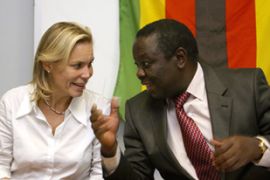EU presses Mugabe on reforms
Zimbawe’s president meets European officials for the first time in seven years.

It is now looking to normalise relations, but wants proof that Mugabe is committed to tackling issues such as media freedoms and political reform.
“We want this government of national unity to be a success,” Karel de Gucht, the EU aid commissioner, said.
“I think we should acknowledge that there is progress made here, but there are still several problems outstanding and we discussed those with the president in a very open atmosphere.”
Separate discussions
The EU did not discuss sanctions during the talks with Mugabe, but did raise the issue in talks held later in Bulawayo with Mugabe’s rival Morgan Tsvangirai, Zimbabwe’s prime minister under the power-sharing arrangement.
“We discussed … issues around the constitutional reforms and other reforms, that’s what the EU is legitimately concerned about,” Tsvangirai said after the meeting.
|
“We established good rapport, no animosity. It was quite a friendly meeting” Robert Mugabe, |
“We also raised the issue of economic co-operation.”
Gunilla Carlsson, Sweden’s development minister and part of the delegation, said the talks focused on ensuring that the power-sharing deal was properly implemented, including guarantees of political and media freedom.
“The implementation must be conducted in a good way. We have discussed accusations of human rights violations, the need for free media and some other things,” she said.
Zimbabwe’s unity government is attempting to rebuild the country’s economy, ravaged by hyper-inflation, and basic services that collapsed under Mugabe’s three decades of rule.
But a year after the South African-mediated unity accord was signed, power struggles over crucial posts and claims of the continued persecution of Tsvangirai’s supporters have made Western states reluctant to provide direct aid to Zimbabwe.
‘Bloody whites’
Just one day before his meeting with the EU, Mugabe lashed out at “bloody whites” for meddling in Zimbabwe’s affairs, but he welcomed the EU delegation with “open arms”, saying his problem was with Britain and not the West at large.
“We established good rapport, no animosity. It was quite a friendly meeting,” he said following the talks.
“They were asking questions about the GPA [the power-sharing deal] and they thought it was not working, yet everything we were asked to do under the GPA we have done and timeously even.”
Mugabe said he was upset at EU travel restrictions and asset freezes against himself and his allies, which he often blames for his country’s woes.
“I was always disappointed that sanctions have been imposed upon the government,” he said.
“Sanctions are serving no humanitarian purpose, they are causing lots of suffering among the people right at the bottom.”
Little effect
Ayesha Kajee, programme director for the International Human Rights Exchange, said that the removal of sanction would have little effect on Zimbabweans.
“I believe that lifting sanctions won’t have any significant impact on the man in the street because the sanctions currently in place are targeted sanctions, targeted at high-level government ministers and people within the government,” she told Al Jazeera from Johannesburg, in neighbouring South Africa.
“However, it has been a convenient scapegoat for Mr Mugabe and his government to lambast the West and the European Union.”
Despite a call by the Southern African Development Community for sanctions to be dropped, the EU maintains that mismanagement and a poor human-rights record – rather than the sanctions – are behind the Zimbabwe’s problems.